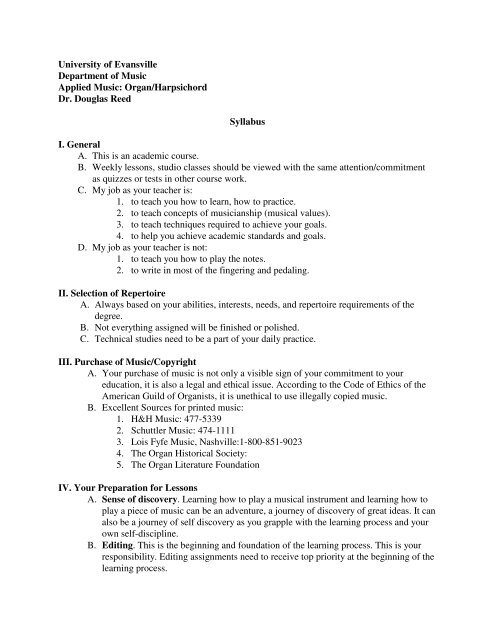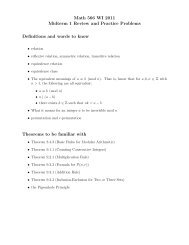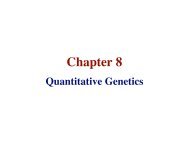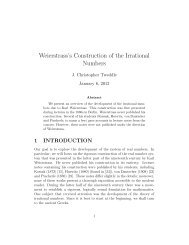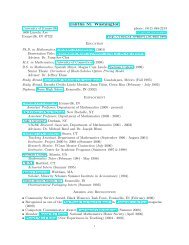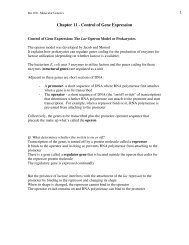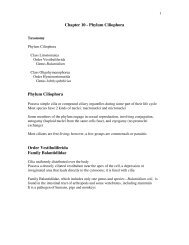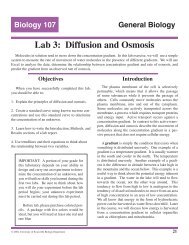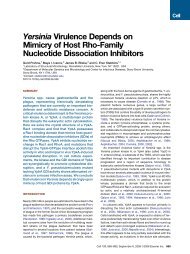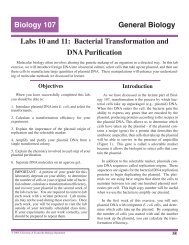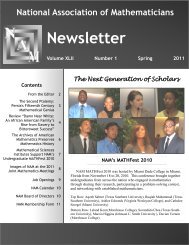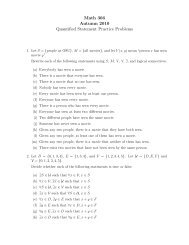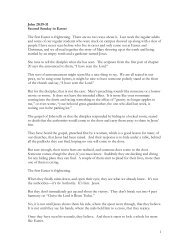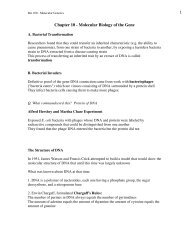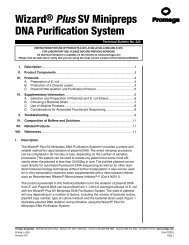Organ/Harpsichord Dr. Douglas Reed Syllabus I. General A. This is an
Organ/Harpsichord Dr. Douglas Reed Syllabus I. General A. This is an
Organ/Harpsichord Dr. Douglas Reed Syllabus I. General A. This is an
You also want an ePaper? Increase the reach of your titles
YUMPU automatically turns print PDFs into web optimized ePapers that Google loves.
University of Ev<strong>an</strong>svilleDepartment of MusicApplied Music: <strong>Org<strong>an</strong></strong>/<strong>Harpsichord</strong><strong>Dr</strong>. <strong>Douglas</strong> <strong>Reed</strong><strong>Syllabus</strong>I. <strong>General</strong>A. <strong>Th<strong>is</strong></strong> <strong>is</strong> <strong>an</strong> academic course.B. Weekly lessons, studio classes should be viewed with the same attention/commitmentas quizzes or tests in other course work.C. My job as your teacher <strong>is</strong>:1. to teach you how to learn, how to practice.2. to teach concepts of musici<strong>an</strong>ship (musical values).3. to teach techniques required to achieve your goals.4. to help you achieve academic st<strong>an</strong>dards <strong>an</strong>d goals.D. My job as your teacher <strong>is</strong> not:1. to teach you how to play the notes.2. to write in most of the fingering <strong>an</strong>d pedaling.II. Selection of RepertoireA. Always based on your abilities, interests, needs, <strong>an</strong>d repertoire requirements of thedegree.B. Not everything assigned will be fin<strong>is</strong>hed or pol<strong>is</strong>hed.C. Technical studies need to be a part of your daily practice.III. Purchase of Music/CopyrightA. Your purchase of music <strong>is</strong> not only a v<strong>is</strong>ible sign of your commitment to youreducation, it <strong>is</strong> also a legal <strong>an</strong>d ethical <strong>is</strong>sue. According to the Code of Ethics of theAmeric<strong>an</strong> Guild of <strong>Org<strong>an</strong></strong><strong>is</strong>ts, it <strong>is</strong> unethical to use illegally copied music.B. Excellent Sources for printed music:1. H&H Music: 477-53392. Schuttler Music: 474-11113. Lo<strong>is</strong> Fyfe Music, Nashville:1-800-851-90234. The <strong>Org<strong>an</strong></strong> H<strong>is</strong>torical Society:5. The <strong>Org<strong>an</strong></strong> Literature FoundationIV. Your Preparation for LessonsA. Sense of d<strong>is</strong>covery. Learning how to play a musical instrument <strong>an</strong>d learning how toplay a piece of music c<strong>an</strong> be <strong>an</strong> adventure, a journey of d<strong>is</strong>covery of great ideas. It c<strong>an</strong>also be a journey of self d<strong>is</strong>covery as you grapple with the learning process <strong>an</strong>d yourown self-d<strong>is</strong>cipline.B. Editing. <strong>Th<strong>is</strong></strong> <strong>is</strong> the beginning <strong>an</strong>d foundation of the learning process. <strong>Th<strong>is</strong></strong> <strong>is</strong> yourresponsibility. Editing assignments need to receive top priority at the beginning of thelearning process.
C. Metronome practice. Slow practice with the metronome during <strong>an</strong>d after the editingprocess <strong>is</strong> one of the most effective ways to learn provided that musical values arealways kept in mind. Being able to play a piece with the metronome <strong>is</strong> not a guar<strong>an</strong>teeof a fine, musical perform<strong>an</strong>ce, however. Fine musical perform<strong>an</strong>ces are rarely, ifever, metronomic.D. Cons<strong>is</strong>tency. Daily practice <strong>is</strong> a key to steady progress. Challenging yourself, <strong>an</strong>dbeing able to play a particular passage cons<strong>is</strong>tently in a particular way, <strong>is</strong> a key to reallearning.E. D<strong>is</strong>cipline. The d<strong>is</strong>cipline of learning <strong>an</strong>d practicing has nothing to do with reward<strong>an</strong>d pun<strong>is</strong>hment. D<strong>is</strong>covering how to play a musical instrument c<strong>an</strong> be a joyfuld<strong>is</strong>cipline. It <strong>is</strong> its own reward.F. Memorization. The memorization process begins the second time you look at apiece. <strong>Th<strong>is</strong></strong> process grows out of the editing process <strong>an</strong>d thoughtful practice.Memorization <strong>is</strong> not a separate process from learning.G. Sight-reading <strong>is</strong> not learning. Sight reading <strong>is</strong> a valuable skill which <strong>is</strong> too oftenconfused with learning. Being able to read easily through a piece does not necessarilyme<strong>an</strong> that the piece <strong>is</strong> learned. Indeed, a well-developed sight-reading skill c<strong>an</strong>present extra challenges to true learning.V. Studio/Perform<strong>an</strong>ce Class; Workshop RecitalsA. Stepping stones in the learning processB. Opportunities to test oneselfC. Opportunities to learn the repertoire by l<strong>is</strong>teningD. Opportunities to support colleagues in the learning process.VI. Americ<strong>an</strong> Guild of <strong>Org<strong>an</strong></strong><strong>is</strong>tsA. All org<strong>an</strong> students are expected to participate in th<strong>is</strong> professional org<strong>an</strong>ization.VII. Notebooks.A. Notebooks are to be typed on 8 1/2 X 11 paper <strong>an</strong>d compiled in a 3 ring binder. Thequality of notebooks <strong>is</strong> a reflection of your seriousness about the applied area ofstudy.B. <strong>Th<strong>is</strong></strong> semester you will be responsible for reading a book about the org<strong>an</strong> orharpsichord <strong>an</strong>d presenting a brief oral report in class.C. Notebooks should include:1. syllabus2. notes on composers <strong>an</strong>d pieces performed in classes3. all pertinent recital programs <strong>an</strong>d service leaflets4. all h<strong>an</strong>douts, diagrams, stop-l<strong>is</strong>ts5. notes on book reports.6. <strong>an</strong>ything else you would like to include7. notes on PIPEDREAMS programs (Majors: 6; minors/elective 3)
VIII. Recital Attend<strong>an</strong>ceA. Music majors are required to attend Thursday workshop recitals.B. <strong>Org<strong>an</strong></strong> majors are required to attend all keyboard recitals <strong>an</strong>d masterclasses.C. <strong>Org<strong>an</strong></strong> students are required to attend all org<strong>an</strong> recitals, masterclasses, workshops.IX. GradesA. Grades are based on the quality of:1. weekly preparation of lessons2. studio class perform<strong>an</strong>ces3. workshop perform<strong>an</strong>ces4. perform<strong>an</strong>ce juries.5. Recital attend<strong>an</strong>ce <strong>an</strong>d quality of notebook are import<strong>an</strong>t parts of the grade.X. JuriesA. All students will perform a jury at the end of the semester. Minimum requirements,adjusted according to length <strong>an</strong>d difficulty of pieces, are:1. Majors (2 or 3 hrs. credit): three pieces (at least two memorized)2. Minors or elective (1 hr. credit): two pieces (at least one memorized)3. <strong>Org<strong>an</strong></strong><strong>is</strong>ts will perform at least two verses of a hymn as if leading a large <strong>an</strong>denthusiastic congregation.


